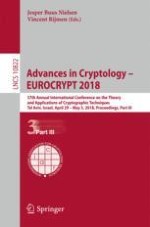2018 | OriginalPaper | Chapter
OPAQUE: An Asymmetric PAKE Protocol Secure Against Pre-computation Attacks
Authors : Stanislaw Jarecki, Hugo Krawczyk, Jiayu Xu
Published in: Advances in Cryptology – EUROCRYPT 2018
Publisher: Springer International Publishing
Activate our intelligent search to find suitable subject content or patents.
Select sections of text to find matching patents with Artificial Intelligence. powered by
Select sections of text to find additional relevant content using AI-assisted search. powered by
